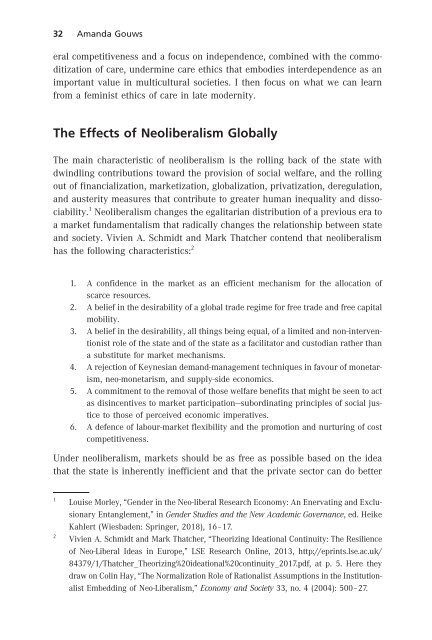Piet Naudé | Michael Welker | John Witte, Jr. (Eds.): The Impact of Political Economy (Leseprobe)
In our late modern pluralistic societies, there are tensions and complementarities between a plurality of individual and social claims and activities to shape societal life and a constructive pluralism of what is known as social systems. The latter provide normative codes and powers emanating from the areas of law, religion, the family, the market, the media, education, academic research, health care, defense and politics. A better understanding and steering of this complex division of powers is crucial for the common good and for freedom and peace. In this volume, a multi-disciplinary team of experts from Germany, Italy, Australia, the UK, the USA, and South Africa bring their conceptual, empirical and historical insights to bear in three broad sections: »The moral dimension of social systems«; »The interaction of religion, law and education with political systems«; and »The moral (mal)-formation evident in case studies on the global financial crisis and social media«.
In our late modern pluralistic societies, there are tensions and complementarities between a plurality of individual and social claims and activities to shape societal life and a constructive pluralism of what is known as social systems. The latter provide normative codes and powers emanating from the areas of law, religion, the family, the market, the media, education, academic research, health care, defense and politics. A better understanding and steering of this complex division of powers is crucial for the common good and for freedom and peace.
In this volume, a multi-disciplinary team of experts from Germany, Italy, Australia, the UK, the USA, and South Africa bring their conceptual, empirical and historical insights to bear in three broad sections: »The moral dimension of social systems«; »The interaction of religion, law and education with political systems«; and »The moral (mal)-formation evident in case studies on the global financial crisis and social media«.
Create successful ePaper yourself
Turn your PDF publications into a flip-book with our unique Google optimized e-Paper software.
32 Amanda Gouws<br />
eral competitiveness and afocus on independence, combined with the commoditization<br />
<strong>of</strong> care, undermine care ethics that embodies interdependence asan<br />
important value in multicultural societies. Ithen focus on what we can learn<br />
from afeminist ethics <strong>of</strong> care in late modernity.<br />
<strong>The</strong> Effects <strong>of</strong> Neoliberalism Globally<br />
<strong>The</strong> main characteristic <strong>of</strong> neoliberalism is the rolling back <strong>of</strong> the state with<br />
dwindling contributions toward the provision <strong>of</strong> social welfare, and the rolling<br />
out <strong>of</strong> financialization, marketization, globalization, privatization, deregulation,<br />
and austerity measures that contribute to greater human inequality and dissociability.<br />
1 Neoliberalism changes the egalitarian distribution <strong>of</strong> aprevious era to<br />
amarket fundamentalism that radically changes the relationship between state<br />
and society. Vivien A. Schmidt and Mark Thatcher contend that neoliberalism<br />
has the following characteristics: 2<br />
1. Aconfidence in the market as an efficient mechanism for the allocation <strong>of</strong><br />
scarce resources.<br />
2. Abelief in the desirability <strong>of</strong> aglobal trade regime for free trade and free capital<br />
mobility.<br />
3. Abelief in the desirability, all things being equal, <strong>of</strong> alimited and non-interventionist<br />
role <strong>of</strong> the state and <strong>of</strong> the state as afacilitator and custodian rather than<br />
asubstitute for market mechanisms.<br />
4. Arejection <strong>of</strong> Keynesian demand-management techniques in favour <strong>of</strong> monetarism,<br />
neo-monetarism, and supply-side economics.<br />
5. Acommitment to the removal <strong>of</strong> those welfare benefits that might be seen to act<br />
as disincentives to market participation—subordinating principles <strong>of</strong> social justice<br />
to those <strong>of</strong> perceived economic imperatives.<br />
6. Adefence <strong>of</strong> labour-market flexibility and the promotion and nurturing <strong>of</strong> cost<br />
competitiveness.<br />
Under neoliberalism, markets should be as free as possible based on the idea<br />
that the state is inherently inefficient and that the private sector can do better<br />
1<br />
2<br />
Louise Morley, “Gender in the Neo-liberal Research <strong>Economy</strong>: An Enervating and Exclusionary<br />
Entanglement,” in Gender Studies and the New Academic Governance, ed. Heike<br />
Kahlert (Wiesbaden: Springer, 2018), 16–17.<br />
Vivien A. Schmidt and Mark Thatcher, “<strong>The</strong>orizing Ideational Continuity: <strong>The</strong> Resilience<br />
<strong>of</strong> Neo-Liberal Ideas in Europe,” LSE Research Online, 2013, http://eprints.lse.ac.uk/<br />
84379/1/Thatcher_<strong>The</strong>orizing%20ideational%20continuity_2017.pdf, atp.5.Here they<br />
draw on ColinHay, “<strong>The</strong>Normalization Role <strong>of</strong> RationalistAssumptions in theInstitutionalist<br />
Embedding <strong>of</strong> Neo-Liberalism,” <strong>Economy</strong> and Society 33, no. 4(2004): 500–27.
















